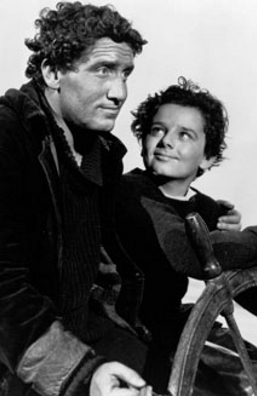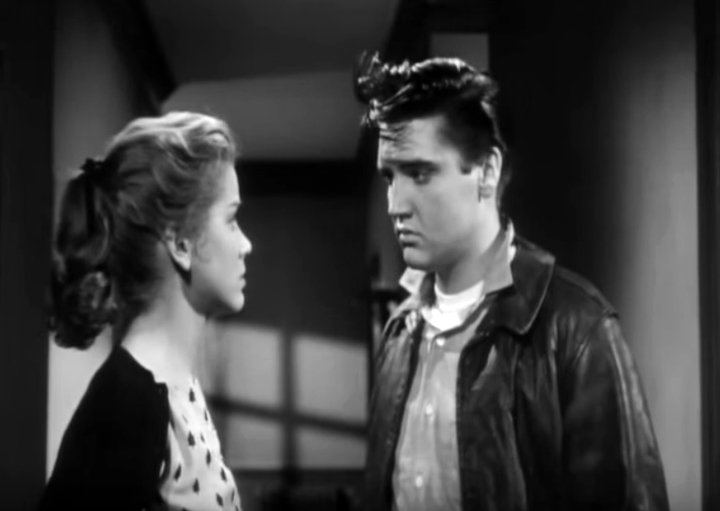By Mary
Claire Kendall
 |
Gary Cooper publicity photo
for Morocco (1936) |
When
two-time Oscar winner Denzel Washington won the Golden Globe Cecil B. DeMille
Award earlier this year, Tom Hanks, himself an Oscar two-timer, glided over
some Hollywood giants in his introduction of “Denzel.”
Like Spencer
Tracy, Gary Cooper and John “Duke” Wayne.
“It’s odd how many of these immortals of the silver screen of the firmament,”
he said, “need only one name to conjure the gestalt of their great artistry. In
women, it’s names like Garbo, Hepburn, Stanwyck, Loren. With men it’s Bogart,
Cagney, Gable. Now you can chuck in the ones, who combination punch, of Gary
Cooper or John Wayne. But a solo tag is the norm. Brando, Clift, Poitier,
McQueen, Hoffman, DeNiro, Pacino… The list is finite. The club is exclusive…”
Spence, Coop
and Duke are three “immortals of the silver screen of the firmament.” And, they
tower.
 |
Spencer Tracy and Freddie Bartholomew
in Captains Courageous (1937) |
Tracy,
who left us 49 years ago today, also won two Oscars for, respectively, Captains Courageous (1937)
and Boys Town (1938). As did
Coop for Sergeant York (1941)
and High Noon (1952), along with an honorary Oscar for his entire
body of work. He was such a legend that, shortly before his death 55
years ago this May, President John F. Kennedy spent a day trying to get
through, as he competed with the likes of Queen Elizabeth II, Audrey Hepburn
and Ernest Hemingway, calling to say their goodbyes.
Duke, for
his part, won an Oscar for True Grit (1969),
which premiered 10 years to the day before his death on June 11, 1979. Like
Denzel, he also received the Cecil B. DeMille Award.
Of course,
Hanks’ oversight was, no doubt, inadvertent—no disrespect intended—even though
he failed even to mention Tracy, considered by his peers to be the greatest
actor Hollywood had ever seen. In addition to his wins, he garnered seven more
Best Actor nominations including, posthumously, for Guess Who’s Coming to Dinner (1967).
The trio,
like so many stars in the silver screen’s firmament, deserves respect.
 |
| John Wayne in Wake of the Red Witch (1948) |
For their
art—the raison d’être of the Academy of Motion Picture Arts and
Sciences. (Sure, Louis B. Mayer had convened industry insiders in January
1927 in his effort to stem labor disputes. But, Mary Pickford and others
envisioned a body that would enshrine film as the art, which, in its finest
form, it surely is.)
Then
there are the living legends which, not two weeks after Hanks’ Golden Globe
oversight, were disenfranchised by the Academy as part of its misguided effort
to redress, by ‘widening its nets,’ the Academy’s collective failure this year
to nominate any African American stars for an Oscar. (Though many like George
Clooney rightly note the problem lies with the pipeline.) If these members are
inactive for 10 years and do not meet certain criteria, their status will be
changed to “emeritus” with all the privileges of Academy membership—except
Oscar voting.
Not so
fast, says Academy member Mother Dolores Hart, known for Wild Is the Wind (1957), King Creole (1958) and Oscar-nominated God Is The Bigger Elvis (2012). These
older members, she said, are the “wisdom figures.” And, when the Academy loses
them it “is going to destroy something of the essence of how people look at” it
and “the quality” with which they associate it. “It’s always been the
star in the sky” among all the guilds. “And, I think they are going to lose
that.”
 |
| Elvis Presley and Dolores Hart in King Creole (1958) |
Not all
of the lifetime members will be disenfranchised, and irrespective of their
status, some like Oscar-winner Olivia de Havilland, known for Gone with the Wind (1939) and The Heiress (1949), do not choose
to vote. But, many will lose voting status. This “hurts” said Mother
Dolores, not only for herself but for the sake of her academy friends, who, she
said, are “precious and have such value.”
Mother
Dolores was brought out of retirement in 1998 by Oscar-winner Karl Malden, then
president of the Academy. In 1963, at the end of the Come Fly with Me press junket, her limousine’s final destination
was the Abbey of Regina Laudis in Bethlehem, Connecticut, where she has lived
in consecrated life for 53 years. “We want to hear what you say and what you
experience, because you have experienced it from a different place,” she said
Malden told her when he called.
“I think
they should rethink this,” said Mother Dolores, “and see if there’s something
else they can offer.”
Surely,
they will come up with a solution that keeps the Academy, like the “immortals”
of the “firmament,” glistening.
Mary
Claire Kendall is the author of Oasis: Conversion Stories of Hollywood Legends, which includes chapters on Gary Cooper and John Wayne and discusses
Spencer Tracy in the overview chapter, which includes a never-before-published
photo with his disabled son, John, c. 1927.








 Mary Claire Kendall
Mary Claire Kendall